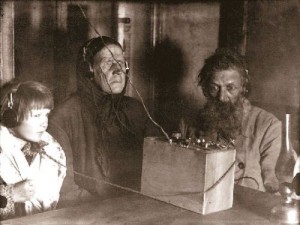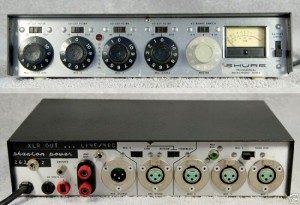Radio DaZe:
Announcers at any radio station have additional duties that they perform as part of their day. It’s nice to think that the time on the air is all we do but it’s far from the case, especially now in the age of voice tracking. But that is many years from our point in time.
The main other duty I had at WJNC was “productionâ€, which meant the recording of commercials. I had done some of this at WKNE and a little at WSNO so I knew what was expected. What I wasn’t expecting was the VOLUME. WJNC/WRCM may not have had a lot of things but it had a sales staff. And the WRCM spots were selling for “A dollar a holler†literally. $1 per instance of the commercial playing on the rotten station.
So needless to say my first few days at WJNC after my airshift were somewhat of a culture shock. I was shown the production room, a tiny equipment-filled closet- like space in the basement. The first day the copywriter delivered a stack of scripts, maybe five or so, along with background material, music or sound effects either on an LP or a tape, possibly another cart. The mission was to record the scripts, add the backgrounds and transfer to carts for use on WJNC or WRCM.
Of course the same spot often ran on both stations so you had to make two carts. The engineers had come through and provided two recording cart machines that started simultaneously. It was a novelty at first but soon it became apparent to me that it was an outright necessity. Too bad one machine was often on the fritz.
Attached to the scripts was a needlessly complex “production order†that you filled out after finishing the job. The carts needed labels but in some quirk of how things were done at WJNC those were already on the order, you just had to peel and stick.
I took immense pride in my production work back in those days. Still do. Pride to me meant doing the job well, and trying my best. So I paced myself on those five commercials, double checking pronunciations, making sure I gave the spots a good read and that technically they were perfect, carted up correctly and with no overmodulation and that they were exactly :30 or :60 seconds as called for. It took me three hours to do the five spots, which I considered a pretty good clip and brought me to 6pm, the end of an eight hour day.
I brought the spots to the copywriter, a serious alcoholic named Jesse who was less than pleased with me. I had cut into his “happy hour†and I found out later you didn’t do that.
“What in hells name took you so long?†were Jesse’s words to me when I arrived. I was taken completely off guard but put on bravado.
“I wanted to do a good job,†I said.
“Well, you are gonna have to learn do a good, goddamn faster job ‘round here,†was Jesse’s surly reply.
I found out what he meant the next day when he doubled my spot load to ten. When he slammed them down on the counter in the production room he looked at me and said “This is a start, there’ll be more.â€
Sure enough the regular production load at WJNC was about 15 to 20 spots daily. On Fridays it was double to account for the weekend. And I had best get them done in time for Jesse’s gin soaked appointment after work. Do the math. If the spots took five minutes each, which was blazing fast, I was pretty much maxed out. I resented it at first but then rose to the challenge. Looking back at it I probably owe Jesse and his slave-driver tendencies a debt. I became an expert at working fast, cutting corners and getting Jesse to his barstool on time, even on Fridays.
It soon became evident to me that the $150 a week I was bringing home was not going to cut it. As I found out often in my career there was never enough money. We bought a washer and dryer on time, which we were so proud of that we took pictures of my then wife standing next to them, beaming. The car needed gas and oil and repairs, the ex-wife needed doctors’ visits and I had to buy a bike to get to work. We had the Italian financial disease, “Fundzalow.†Being tied to the radio station all day limited my options. At WKNE I had tried sales but that was a dead end for me. The PD was not living up to the remote broadcast part of the deal. So I consulted the night guy. He suggested I do mobile DJing, what used to be called “Sock hops.†The morning guy, Mike Shaheed was making money hand over fist doing this, he said. Talk to him, he suggested.
Mike and I were not real close. Shaheed was mostly interested in Shaheed and things that concerned Shaheed. A fair announcer, he was a trak – star when it came to vacating the premises at ten AM. The door never hit his ass on the way out. Mike didn’t get much production which probably explained why I got so much.
I arrived early one day for my shift and asked Mike about the hops and my possibility of getting to do one or more. As it turned out Mike was double booked that Friday night. He was glad to let me do this one in Beulaville if I would pay him a $25 finder’s fee.
It was a disaster.
Beulaville was 30 miles from anywhere. I scurried through my production and got on the road and promptly got real lost. You have never been lost until you are lost on back roads in rural North Carolina. GPS? This was 1973. I finally found a farmer who laughed me at when I told him where I wanted to go. “You are going to Beulaville and you are here?†was what he said. Turns out I had gone miles in the other direction. The dance was to start at 7pm. It was past 6:30. I was screwed already and I wasn’t even close.
Somehow I got to the school, only twenty minutes late.
The engineer had helped me out by cobbling together a crude P.A. System. It consisted of two speakers, an amplifier, fed by a Shure Microphone mixer and a turntable. One turntable. The night guy gave me a stack of ‘45s and I was on my way. I think the gig was to pay $75 in cash; I would get $50 which at the time was an unthinkable fortune. I saw dollar signs. I didn’t notice that the high school I was at was 100% black. Not right away, anyway.
So I tossed the gear together and got a record rolling. The idea was that you played a song, and then did some announcing while you changed records. Two turntables would have helped but that was not in the cards at this stage. Of course there was no way to cue a record so you just needle dropped and vamped until it came up.
But I had forgotten a key component. I had a microphone, but no cable. I found that I could plug the mic right into the back of the mixer and if I held it up I could speak over the P.A. but what I couldn’t do was change records, and hold up the mixer (which must have looked like I was using a giant harmonica) at the same time. It was awkward and embarrassing. I was already soaked in flop sweat and it was just getting worse.
About this time I took notice of the crowd. They were hard to ignore because they were crowding around me and demanding songs I didn’t know and certainly didn’t have. Later on in my career I would learn how to deal with teenagers at high school dances. At this stage of the game I was like raw meat tossed to sharks. It turns out that Shaheed had done me no real favors and played a colossal joke by handing me, lily white northern boy, this gig in an all-black school in backwoods North Carolina.
It was a long night. The ONLY song I had that the increasingly unhappy crowd wanted to hear was “Jungle Boogie†by Kool and the Gang, so I pretty much played that all night long, in between holding up the mixer to my mouth, trying to not to unplug everything in the process.
Playing “Jungle Boogie†probably would get you mugged now. I find it offensive on several levels. The young kids in Beulaville High ate it up.
By the end of the night, probably 10 PM or so, I just wanted to flee. I didn’t care if I got paid or not. I just wanted to get away with my life. The principal, the only other white person I had seen all night, came over and told me to pull the plug. Without another word he handed me a bag, filled with dollar bills and change. I loaded up the car and counted the loot. The fact that I had made $50 took some of the sting out of the evening.
NEXT: We discover how bad a newsreader I am, My days at WJNC end and interviews in the South go South.
The Rant D’Jour is about slowing down.
I used to drive fast. Very fast. I was the type of guy who had the latest radar detector and knew how to use…more
-30-










